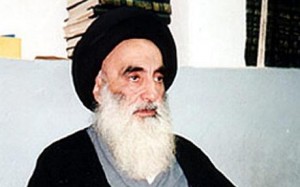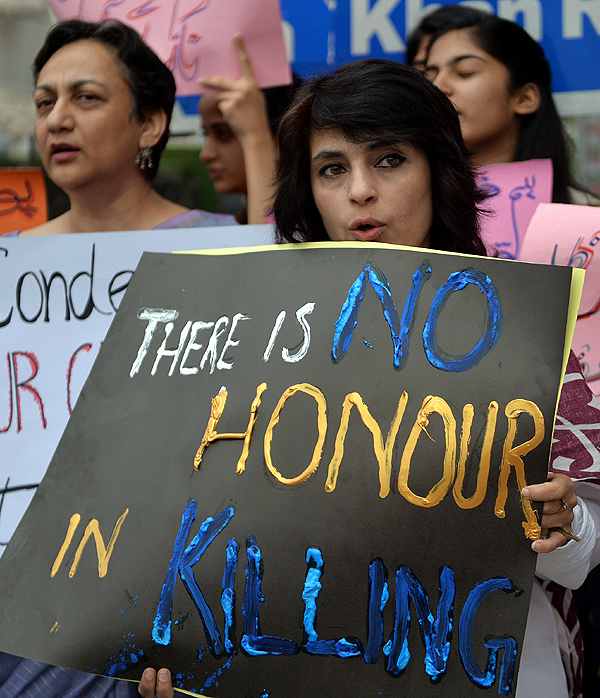Shiite spiritual leader, Al Sistani calls for unity government in Iraq
Sunday, June 22nd, 2014 7:16:50 by Nadeem Bajwa
The spiritual leader of Iraqi Shiites, Grand Ayatollah Ali Hussein al-Sistani on Friday urged politicians to agree on a new government as soon as possible to end the sectarian divide that threatens to plunge the country into another war. His words come at a time when several parties gauge how to prevent a third term of Nuri al-Maliki, whom they blame for deepening political divisions. The day before, the U.S. linked its aid against Sunni insurgents to an inclusive Executive is formed, something that opponents interpreted as support for the relief of the prime minister.
“We need a dialogue between the winners block [ the elections last April ] for a national government to get approval to form,” Sistani said in a message read by his spokesman, Ahmed al Saafi, during the prayer of Friday in Kerbala. The Shiite dignitary also requested that the new government is “effective ” and ” avoid the mistakes of the past,” a thinly veiled criticism of the management of Al Maliki.
The unusual intervention of Ayatollah, the second in as many Friday highlights concern about the crisis has opened the offensive of the Islamic State in Iraq and the Levant (ISIS) in northwestern country. Although Prime Minister won the largest number of seats in the legislative, is having difficulty finding backups for another term. There are fears that attempts to use the military operation against the rebels to delay the establishment of Parliament, marking the legal terms to form a government.
Al Maliki, in power since 2006, had become a controversial figure even before the jihadist offensive. The National Coalition, an alliance of Shiite parties that supported his second year in 2010, warned earlier this month that it was not safe to go and vote for him again. Now, how has faced making Mosul by insurgent has succeeded in uniting against Sunnis, Shiites and Kurds.
” The greatest danger to this country right now is political polarization. Opposition parties, both Shia and Sunnis and Kurds, are willing to use the security situation to prevent Al Maliki access a third term, even at the expense of support to armed groups, “said Omran to Obaidy, chief opinion newspaper Al Ittihad.
“There have been meetings between Iyad Allawi [ Kurdish leader ] Massoud Barzani and the Sadrists,” confirms Qays al Shadhr, deputy of Al Wataniya, as renamed in the last elections formation headed by former Prime Minister Allawi and has the sympathy of most of the Sunni Arab community. The deputy said that ” has not been entered names ” but notes that “the chosen must have the confidence of all communities, which excludes those who have failed in their duty.”
Other politicians are more blunt. ” Al Maliki has to leave,” says Amir al Kenani, deputy of Al Ahrar, the party of the followers of Shiite cleric Muqtada al-Sadr. Also an adviser to Osama al Nuyaifi, outgoing president of Parliament and prominent Sunni leader, said that “we must replace that man if we want things to calm down.” Spokesmen Kurds have also been expressed in this regard.
Furthermore, both the political rivals of the prime minister and the observers have interpreted the U.S. response to the request for help from Al Maliki supports relieved. Barack Obama ‘s statement Thursday was not the life that the Iraqi government had hoped. Instead of ensuring the immediate bombing of rebel positions, the U.S. president stressed the need for a unifying figure.
“Most Iraqis were disappointed,” said Ali al- Fayad, party deputy State of Law, who recalls that Iraq signed a strategic cooperation agreement with Washington. ” If Iraqis conclude that worthless, will have to seek other assistance to protect, “he adds.
The New York Times claimed in its Friday edition that since days before the appearance of Obama, Iraqi politicians are meeting with U.S. officials in search of a personality of consensus. Even mentions three names that are being considered: Abdulmahdi Adel, Ahmed Chalabi and Bayan Jaber.
Al Shadhr remember, however, that State of Law party, Al Maliki, won 93 seats in Parliament. ” That can not be put aside in the political process,” he says, ” but the new government must be led by someone they can trust all communities, including the [ Sunni ] people of Nineveh, or Saladin Al Anbar.”
So one of the alternatives was that the group participate in the election of a candidate of the National Coalition that was acceptable to the rest of the formations. Apparently, Al Maliki has already rejected that option. So now rivals attempt to form an alternative block to meet Al Ahrar, Al Wataniya, Al Muttahidun (formation of the Sunni Al Nujayfi) and Kurds. “Exclude the rule of law would be very expensive because the division of the Shia,” admits Al Kenani who also fears the prime minister would use force. “He wants to stay in power,” he says.
Al Obaidy, journalist Al Ittihad, agrees. Described Maliki as “a man of strong convictions, that after the election you think you have the right to govern.” In the end, convinced that the continuation or not of prime minister depends ” both the success of their counter-offensive against Sunni insurgents, and the will of Iran and the United States.”
Short URL: https://www.newspakistan.pk/?p=45525

















